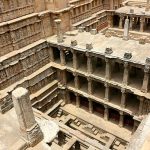- Location: Aravalli Range, Rajasthan
- Built by: Built between the 5th and 18th centuries CE by Rajput rulers.
- Comprises Six Forts
- Chittorgarh Fort: Symbol of Rajput chivalry; known for jauhar events.
- Kumbhalgarh Fort: Second-longest continuous wall after the Great Wall of China; birthplace of Maharana Pratap.
- Ranthambhore Fort: Associated with the Chauhan dynasty; strategic forest setting.
- Gagron Fort: Unique as a water fort (Jal Durg), surrounded by rivers and a moat.
- Amber Fort: Famous for artistic elements blending Hindu and Mughal styles.
- Jaisalmer Fort: One of the few “living forts”; still houses a large resident population.
- Cultural Significance
- Represent Rajput ideals of honor, valor, and sacrifice.
- Centers of power, trade, culture, and religion in medieval Rajasthan.
- Integrated settlement systems reflecting socio-political organization.


